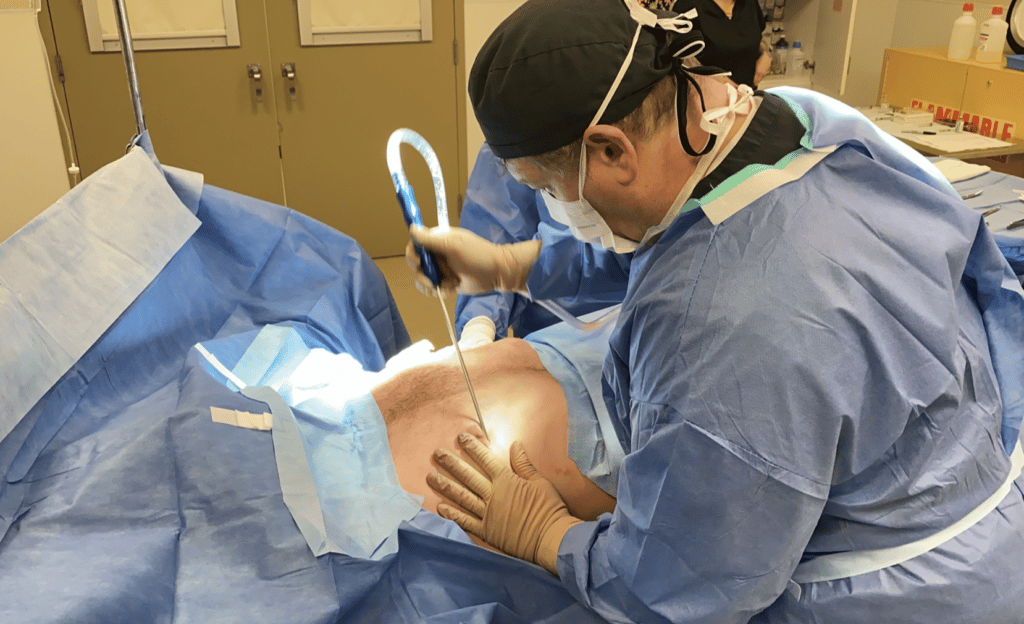Removing excessive growth of breast tissue to transform your chest into a body feature that you won’t feel embarrassed or ashamed about
Enlarged breasts in men (gynecomastia) can be caused by a number of factors, including hormonal changes, genetics, diseases, and prescription or illicit drugs (such as marijuana). This condition cannot be eliminated through dieting or exercise. The majority of male breast surgery procedures are performed on men between the ages of 13 and 19. In some cases, techniques similar to liposuction are used to remove excess fatty tissue. Others may require surgical intervention, which ranges in complexity depending on the amount of excess breast tissue present.
Is Gynecomastia Surgery Right for Me?

Men with enlarged breasts may experience a host of feelings—including self-consciousness and humiliation. They may also avoid physical activities and intimacy in an effort to hide their condition. During your initial consultation, Dr. Dawes will perform a thorough evaluation of your chest. He will determine if you are a good candidate for gynecomastia surgery.
How Male Breast Surgery in Calgary is Performed
Dr. Dawes usually performs male breast surgery on an outpatient basis. This surgery takes approximately one-and-a-half hours to complete, and is performed under general anesthesia or local anesthesia with sedation. For excess fatty tissue, liposuction alone may be used. If there is excess skin that needs to be removed, excision techniques may be performed alone or in conjunction with liposuction.
During the liposuction procedure, an incision is made around the lower half of the nipple area. A cannula is inserted through the incision and moved back and forth in a controlled motion to dislodge excess fat. The fat is then suctioned from the body. Bandages are applied to the incisions; a compression garment may also be used to minimize swelling.

Recovery Expectations
You can expect moderate discomfort of the chest, which should gradually improve over 3-4 days. Swelling usually subsides after three weeks, but can occasionally persist longer. Bruising may occur, it will be worst at 3-4 days and may persist for up to three weeks. No heavy lifting or strenuous exercise of the upper body for four weeks. Full recovery can take about two to four weeks, and results are usually permanent.
Gynecomastia FAQs
Gynecomastia is commonly due to hormonal changes during puberty although, weight gain may also result in breast development.
Gynecomastia surgery improves the contour of the male chest by removing the breast tissue and soft tissues that contribute to the unwanted appearance. Dr. Dawes will carefully evaluate your situation to determine which surgical techniques are needed.
It depends on whether the excess volume in the breast area is caused by a growth of fat or glandular tissue. If hormones are responsible for the excessive volume, liposuction will not be as effective as excision. Sometimes Dr.Dawes will recommend a combination of liposuction and surgical excision of tissue.
Dr. Dawes will evaluate the severity of the breast enlargement to determine what surgery is required. For many patients a combination of liposuction and glandular removal or removal of lifting or hanging chest skin will help restore the desired masculine appearance.
The specific scarring is determined by the method of male breast reduction surgery. If liposuction is necessary, your surgeon will make two small incisions to suction out fat cells. All scars are carefully placed by Dr. Dawes and will fade with time.
Yes, the results are permanent.
You can expect to return to light exercise in 2 weeks and 4-6 weeks for strenuous activity.
The chest may initially look fuller than before. This is entirely normal, as it takes between 1-3 months for the swelling to settle. You will notice that the chest has a more natural look once the swelling subsides.
Jeffrey C. Dawes, MD is a Board-Certified plastic surgeon practicing in Calgary, Alberta. He has the experience necessary to ensure you look and feel great after your surgery. Contact him today online or by calling 403-571-3141.


